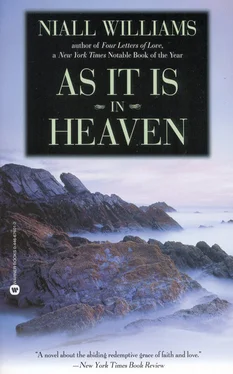Philip watched the top of his head and wondered if Jimmy would recognize him. He didn't, and a small loss smarted in the tailor like a sudden discovery in the death notices. He held out his money to the girl at the counter and paid in cash for a ticket and a hotel room. Then he drove to the hospital and spoke with Hadja Bannerje.
Finally, he arrived home with the envelopes in his pocket, like the folded certificates of his fatherhood. He stood inside the door and gasped as the pain roiled and made his eyebrows rise involuntarily, as if making room in his face for new suffering.
“Here,” he said, and held out the envelopes.
The first one Stephen opened was the headed notepaper of Dr. Hadja Bannerje and the declaration in slanted blue ink that Stephen Griffin was currently the patient of the undersigned and that he could not return to work at the present time, for his condition necessitated monitoring under the care of yours sincerely, Dr. Hadja Bannerje.
Stephen finished reading it and looked at where the grey slump of his father was leaning against the door.
“Well?” said Philip Griffin with a breathy inhale. “That's, her complaints fecked. We'll send that off to the old bitch tomorrow. Open the next one.” The father nodded, he touched his tongue to wet his lips and half-grinned half-grimaced at the madcap and wild plan, its rash and foolhardy nature that was not in his character, that was the reversal of his previous position, but to which he had given himself with a kind of sweet and feckless madness that made him imagine, against all the evidence of his life and amidst the broken and long-smouldering ruins of his own heart, that here now, at last, for his son, he could play the angel of love.
Stephen opened the second envelope and found the ticket to Venice.
“Go,” his father said, and did not move, speaking with that purity of motive that makes men saints, and hearing himself say the words he wanted said to him and which instead, for another while at least, stayed suspended in the lonely silence of his eyes.
“Go,” he said. “Go and find her.”
 By the time Gabriella Castoldi had arrived back in Venice, she knew she was carrying Stephen Griffin's child, and bore it with sour bouts of illness up and down the steps of the Rialto and through the fish-fumed air of the narrow streets to the house of her spinster cousin, Maria, in the Calle dei Botteri. Maria Feri was fifty years old and still worked in the papeterie in the Calle Piovan where she had first earned wages as a girl. She welcomed Gabriella on the day before Christmas, when the grey dampness seeped through the air of the city like the cloths of drowned ghosts, and the seasonal efforts of the inhabitants to hold off melancholia was mostly manifest in the quickened movements down the alleyways and across the bridges, a hastening towards the year's end, urgent with shopping and the little clusters of families hurrying to and from visits with unbearable relatives.
By the time Gabriella Castoldi had arrived back in Venice, she knew she was carrying Stephen Griffin's child, and bore it with sour bouts of illness up and down the steps of the Rialto and through the fish-fumed air of the narrow streets to the house of her spinster cousin, Maria, in the Calle dei Botteri. Maria Feri was fifty years old and still worked in the papeterie in the Calle Piovan where she had first earned wages as a girl. She welcomed Gabriella on the day before Christmas, when the grey dampness seeped through the air of the city like the cloths of drowned ghosts, and the seasonal efforts of the inhabitants to hold off melancholia was mostly manifest in the quickened movements down the alleyways and across the bridges, a hastening towards the year's end, urgent with shopping and the little clusters of families hurrying to and from visits with unbearable relatives.
Maria Feri had prepared for Christmas alone, but the unexpected arrival of her cousin visited her like a secret blessing. Her heart fluttered, roses shot out in the pale powders on her cheeks. She sat Gabriella in her only comfortable chair and tapped the cage of Goldoni, the yellow-feathered bird she had named with an endearing lack of originality, who was her truest companion and could, she said, flushing with shyness, sing finer than Pavarotti. While Gabriella sat with the bird, Maria made more welcoming the guest room where no guest had ever stayed; she carried through the sitting room extra blankets, a jug of fresh water, two apples, and the potted lemon plant which was dying in the kitchen, all the time struggling to keep the deep joy of her visitor's arrival from showing beneath it a half century of loneliness.
Gabriella sat with Goldoni. Sickness came in waves, and when she went to the window for air, the familiar mildly bitter scent of the canal water turned her insides with a swift churn. She gasped and held on to the rail, feeling both the illness of her pregnancy and the stronger, older malady that was the returning loss and disappointment of her childhood. She caught the air and gagged as if it were brown water. There she was, herself at nine years of age going to the window as if it were a portal of escape from the sharp censure of her father, who sat at the table asking questions of geography and knuckling her brothers' heads when they failed to answer correctly. Gabriella had only just slunk back into the armchair when the angular face of her cousin reappeared through the doorway. Maria saw the pallor of the other woman and supposed it to be sisterly shock at the news of Giovanni. She sat down on the hard chair opposite Gabriella and gave her a glass of mineral water.
“They arrested him last Tuesday,” she said.
She was a thin yet strong woman, whose bones might have been made of an assemblage of the wooden handles of farm tools with skin drawn over them. Her lips were so used to tightness they held her expressions unfreed in a clamp which dared not release the yearning for all the unlived love her life had missed.
“I didn't think it was right,” she said, “Christmas.”
Gabriella smiled a half-grimace. She had not known and took the news like the latest in a long line of defeats above which the ghost of her father was laughing bitterly.
“They said Giovanni had done terrible things. He has been implicated in …” Maria stopped when she saw the wound open in her cousin's expression.
“I cannot help him,” said Gabriella, “it is his own life. I don't know what I could do.” She raised her hands and let them fall with uselessness.
“No, of course,” said Maria Feri, and reached with the large fingers of her hand to touch Gabriella's knee. “You must be tired. Will you come and see if the room is all right? I can change anything you don't like.”
And then it was Christmas in Venice. Rain that was falling in Dublin fell, too, into the Canal Grande and emptied the narrow streets, bathing them in a flowing melancholy until they seemed sometimes awash with the waters of sadness. The buildings perched lofty and aloof from each other, as if they could ignore entirely their lower beginnings and the certainty of their sinking to the victor of Time. The city closed in on itself, and in the sitting room of the house of Maria Feri the two women sat on either side of despair. Gabriella had not told her cousin of her pregnancy. She had given her as a Christmas gift the two bottles of bath powders that Nelly Grant had concocted as a complement to love, but Maria had put them safely away in a dry press, where all her treasured things awaited the arrival of happiness. She sat and made coffee and read long novels and fussed over her visitor. She fed Goldoni French biscottes and carried his cage away from the draught of the window when she realized he had not sung in three days.
Gabriella did not know what she was doing there. She did not know yet that she could not repair the past, and so her mind brooded on the failed pregnancies of her mother, the miscarried sisters who, like some treasured but lost luggage, had never appeared, and left her gaping at a revolving emptiness. Gabriella questioned herself with the rigour of her father. She interrogated Love until it could not answer and broke down in choked-up confusion that could only mean there was none: she did not love Stephen Griffin. Time and again, she sat under the glare of examination and, while her cousin whistled at the bars of the caged bird, she turned over in her head the impossible questions. What should she do? How could she be in love with that man? He did not love her either, did he? He loved her violin. He loved the idea of her, and had fallen in love with his own imagination.
Читать дальше

 By the time Gabriella Castoldi had arrived back in Venice, she knew she was carrying Stephen Griffin's child, and bore it with sour bouts of illness up and down the steps of the Rialto and through the fish-fumed air of the narrow streets to the house of her spinster cousin, Maria, in the Calle dei Botteri. Maria Feri was fifty years old and still worked in the papeterie in the Calle Piovan where she had first earned wages as a girl. She welcomed Gabriella on the day before Christmas, when the grey dampness seeped through the air of the city like the cloths of drowned ghosts, and the seasonal efforts of the inhabitants to hold off melancholia was mostly manifest in the quickened movements down the alleyways and across the bridges, a hastening towards the year's end, urgent with shopping and the little clusters of families hurrying to and from visits with unbearable relatives.
By the time Gabriella Castoldi had arrived back in Venice, she knew she was carrying Stephen Griffin's child, and bore it with sour bouts of illness up and down the steps of the Rialto and through the fish-fumed air of the narrow streets to the house of her spinster cousin, Maria, in the Calle dei Botteri. Maria Feri was fifty years old and still worked in the papeterie in the Calle Piovan where she had first earned wages as a girl. She welcomed Gabriella on the day before Christmas, when the grey dampness seeped through the air of the city like the cloths of drowned ghosts, and the seasonal efforts of the inhabitants to hold off melancholia was mostly manifest in the quickened movements down the alleyways and across the bridges, a hastening towards the year's end, urgent with shopping and the little clusters of families hurrying to and from visits with unbearable relatives.









